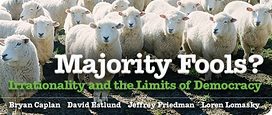Lead Essay
In this month’s lead essay, George Mason University economist Bryan Caplan argues that voters are not just ignorant, they’re irrational. According to Caplan, when the cost of holding irrational beliefs is low–as it is in religion and politics–we should expect a lot of irrational belief. “Even when his views are completely wrong,” Caplan writes, “[the voter] gets the psychological benefit of emotionally appealing political beliefs at a bargain price.” But the low personal cost of irrationality has a high social cost. Caplan provides statistical evidence of voters’ “systematically biased beliefs” in economics, and argues this undermines the electorate’s ability to implement good policy. Caplan suggests we should rely “less on democracy and more on private choice and free markets,” in addition to several other provocative reforms sure to make civics teachers blanch.
Response Essays
In his reply to Bryan Caplan’s lead essay, Brown University political philosopher David Estlund argues that neither of Caplan’s proposed alternatives to democracy, markets and experts, satisfactorily correct for the problem of voter irrationality. With respect to experts, Estlund observes that political questions are moral as well as empirical: “[M]aybe … my morally wise mother would perform better overall than the economists. That settles nothing, since there is no entitlement to rule others based simply on the fact that you know what is best.” As far as markets go, Estlund says “Voters and market actors are the same people, so we should expect the charges of ignorance and irrationality to be leveled against people in both guises… In the aggregate many market mistakes, like voting mistakes, affect everyone.”
University of Virginia political philosopher Loren Lomasky compares Caplan’s criticism of democracy and defense of expertise with Plato’s argument in The Republic, while noting that in a modern system of representative democracy, voters choose among candidates, not policies. “If voters are as intellectually maladroit as Caplan suggests,” Lomasky writes, “then they are incapable of mastery of their elected representatives,” who are thus left with a fairly free hand to set policy. “What [voters] can do, though, is ‘throw the rascals out,’” and that, Lomasky argues, is good enough.
Jeffrey Friedman argues that Caplan’s charge of voter irrationality relies on the unrealistic idealizations of economic theory and that “[v]oters who don’t understand economics because they haven’t been exposed to it, or because they’ve been exposed to it but have found it tough going, aren’t irrational; they’re just ignorant.”
The Conversation
Related at Cato
» When Ignorance Isn’t Bliss: How Political Ignorance Threatens Democracy by Ilya Somin
» Public Ignorance and Democracy by Jeffrey Friedman
» Three Myths about Voter Turnout in the United States by John Samples

